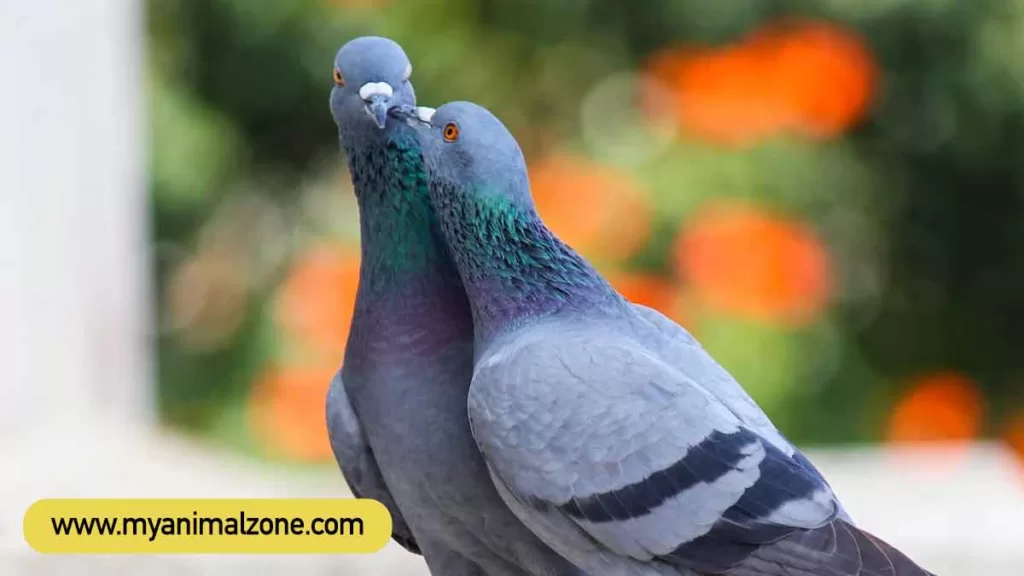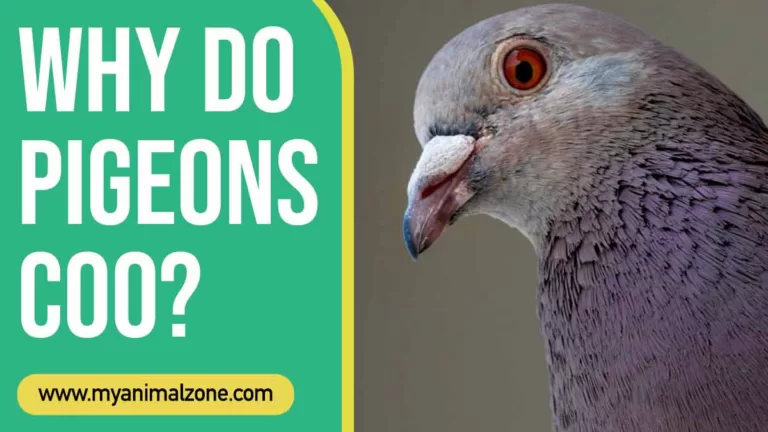If you’ve ever spent time in a park or on a city street, you’ve likely heard the soothing cooing sounds of pigeons. But have you ever wondered why do pigeons coo? In this article, we’ll explore the fascinating reasons behind pigeon cooing.
The Evolutionary Purpose of Pigeon Cooing
Pigeons, like many birds, use vocalizations to communicate with each other. However, pigeon cooing serves a specific purpose – it’s a form of courtship behavior. When male pigeons coo, they’re trying to attract a mate.
Male pigeons will puff up their chests and strut around while cooing to catch the attention of nearby females. The pitch and tone of their coos can indicate their physical fitness and reproductive readiness. Female pigeons, in turn, may respond with their coos or by showing interest in the male’s behavior.
Social Bonding and Communication

Cooing is not just limited to courtship behavior, however. Pigeons also use coos to communicate with other members of their flock. Cooing can be a way of establishing social bonds and asserting dominance within the group.
Pigeons have a complex social hierarchy, and cooing can establish and reinforce the pecking order. For example, a dominant pigeon may use a deeper and more forceful coo to assert its authority over subordinate pigeons.
Environmental Factors and Pigeon Cooing
While courtship and social bonding are the primary reasons behind pigeon cooing, environmental factors can also influence the frequency and volume of coos. For example, pigeons may coo more frequently in the early morning and late afternoon when they’re most active.
Pigeons may also coo more during mating season or when abundant food is available. Additionally, changes in weather patterns, such as rainfall or high winds, can impact pigeon cooing behavior.
Pigeon Cooing and Human Health
Despite their reputation as pests, pigeons can positively impact human health. Studies have shown that listening to bird songs, including pigeon cooing, can reduce stress and anxiety and improve overall mood.
In urban environments, where stress levels are often high, the sounds of cooing pigeons can provide a calming and peaceful ambiance. Pigeons have even been used in animal-assisted therapy programs to help alleviate anxiety and depression in humans.
Types of Pigeon sounds with meanings.
Pigeons communicate through a variety of sounds, each with its unique meaning. Understanding these sounds can provide insights into pigeon behavior and social interactions. Here are some of the different types of sounds that pigeons make and their meanings:
- Cooing – The most well-known pigeon sound is the coo. It’s a soft, rhythmic sound that pigeons make to communicate. Cooing can be a sign of contentment and relaxation, but it can also be a territorial sound. Male pigeons often coo to attract a mate or establish their territory.
- Growling – Pigeons make growling sounds when they feel threatened or uncomfortable. It’s a low, rumbling sound that indicates aggression or fear. Growling is a warning sign that the pigeon may attack if the perceived threat disappears.
- Hissing is another warning sound that pigeons make when they feel threatened. It’s a high-pitched sound often accompanied by fluffed feathers and an aggressive stance. Hissing pigeons are trying to scare away potential predators or threats.
- Alarm Calls – Pigeons make alarm calls when they sense danger or feel threatened. These calls are high-pitched and repetitive, and flapping wings often accompany them. Alarm calls are a way for pigeons to alert others in their flock of potential danger and can help detect predators or other threats.
Overall, pigeons use a variety of sounds to communicate with each other and to establish their social hierarchy. Understanding these sounds can help us better appreciate these fascinating birds and their complex social interactions.
How to get rid of noisy pigeons?
Pigeons are beautiful birds, but their cooing and other sounds can be loud and annoying, especially when congregating in large numbers. If you’re dealing with a pigeon problem and you want to know how to get rid of noisy pigeons, here are some tips to consider:
- Remove Food Sources: One way to discourage pigeons from congregating around your home or business is to remove any potential food sources. This includes securing garbage cans and compost bins, picking up fallen fruits or seeds, and not leaving pet food outside.
- Install Spikes or Netting: Installing physical barriers like spikes or netting on ledges or other surfaces where pigeons roost can prevent them from landing and nesting. These barriers do not harm the birds but make it uncomfortable for them to perch.
- Use Bird Repellents: Various bird repellents are available in the market that can deter pigeons from roosting on your property. Some examples of bird repellents are visual repellents, such as reflective tape; sound repellents, like ultrasonic devices; and scent repellents, such as citrus-based sprays.
- Scare Tactics: Another option is to use scare tactics to make pigeons feel unwelcome. This can include placing fake predators like plastic owls or snakes on your property or using motion-activated sprinklers.
- Seek Professional Help: If the pigeon problem persists, it’s best to seek professional help from a pest control service. These experts can assess the situation and recommend the best action, including trapping and relocating the pigeons.
Q: Do pigeons coo when happy?
A: Pigeons coo to communicate with each other and establish territory, so their cooing may not necessarily indicate happiness. However, pigeons may also coo during courtship or when feeling content.
Q: Can female pigeons coo?
A: Yes, both male and female pigeons can coo. Cooing is a way for pigeons to communicate with each other and establish their social hierarchy.
Q: What does it mean when pigeons coo loudly?
A: Loud cooing may indicate a more aggressive or territorial pigeon, particularly during the breeding season. Pigeons may also coo loudly when threatened or disturbed, such as when a predator is nearby.
Q: What sounds do pigeons fear?
A: Pigeons may fear loud or sudden noises, such as fireworks or car horns, and sounds that mimic predatory birds like hawks or falcons. However, it’s important to note that pigeons can habituate to certain sounds over time and may become less afraid.
In conclusion,
Pigeons are fascinating creatures that have unique vocalizations to communicate with each other. Their sounds have different meanings, including cooing for courtship and establishing territory or alarm calls when sensing danger. While pigeons can be noisy and potentially become a nuisance, there are humane ways to manage their presence, such as removing potential food sources, installing physical barriers, and using repellents or scare tactics. Handling pigeon problems humanely and ethically is essential, as respecting local and state laws protecting these birds. Following these tips, you can effectively manage noisy pigeons and peacefully coexist with them.

